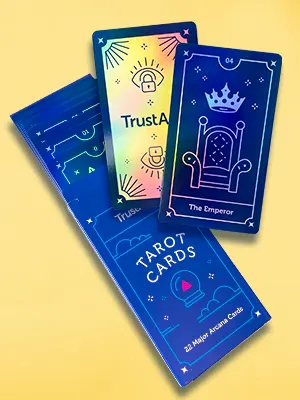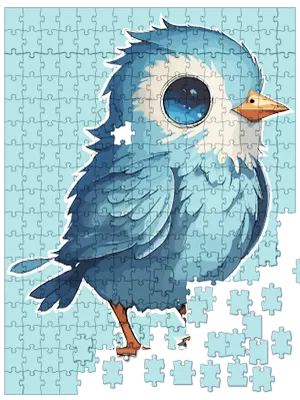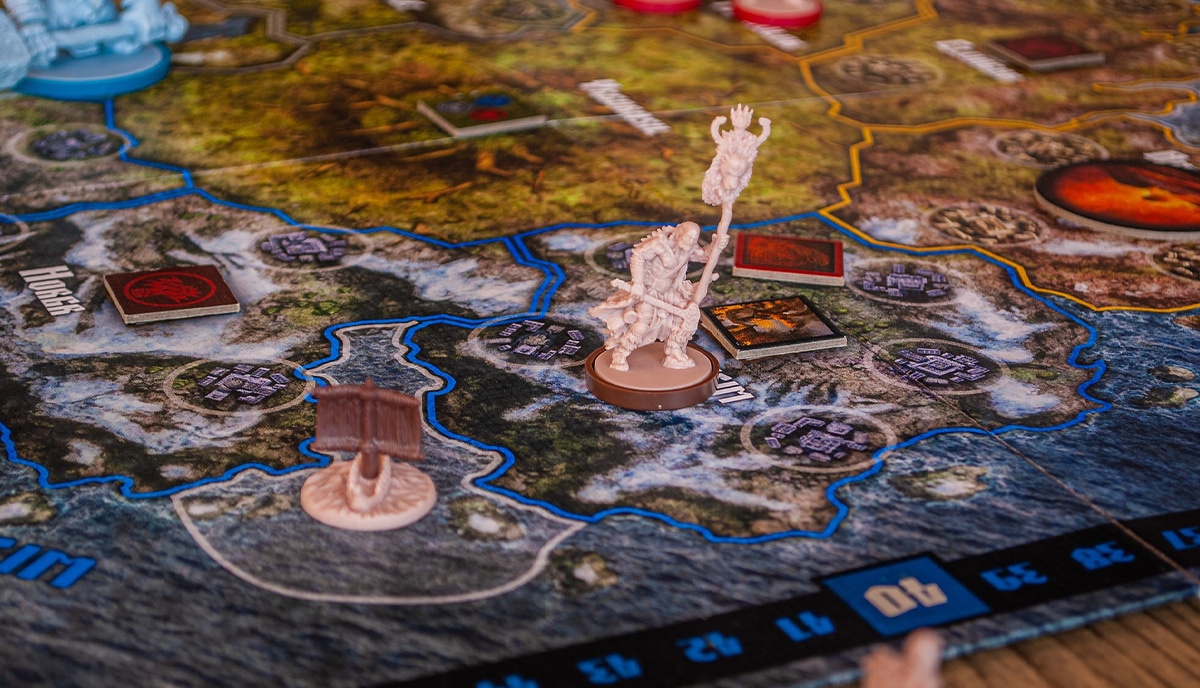While seemingly simple, designing abstract strategy board games is a serious challenge. We explore what abstract strategy games are, why we love them, how to play them, and what to do when you want to design your own

In the world of board games, there is a genre that challenges players to engage in mindful competition, where luck takes a backseat and strategic thinking reigns supreme. These games are known as abstract strategy board games. They offer a unique and immersive experience that transports players to a realm of pure intellectual challenge. Whether you're a seasoned game designer or new to the world of board game creation, abstract strategy games provide an opportunity to design a game which will exercise the players' strategic muscles and immerse them in a world of tactical decision-making.
What are abstract strategy board games?
Abstract strategy board games are a genre of games that require players to make strategic decisions based on their understanding of the game mechanics and the current state of the game. These games are characterized by their lack of luck or chance elements such as dice rolling or card drawing. Instead, they focus solely on the players' skill and strategic thinking.
In abstract strategy games, players typically compete against each other to achieve a specific objective, such as capturing the opponent's pieces, controlling territories, or creating specific patterns on the game board. These games often have simple rules at their core, making them easy to learn and play. However, beneath their simplicity lies a depth of strategy and complexity, offering endless possibilities for strategic exploration.
The appeal of abstract strategy board games
Abstract strategy board games have gained popularity among gamers due to their unique appeal and the intellectual challenge they offer. Unlike games with heavy themes or intricate narratives, abstract strategy games allow players to focus solely on the game mechanics and the strategic decisions they need to make. This focused gameplay creates a sense of immersion and deepens the strategic experience.
One of the key appeals of abstract strategy games is their ability to level the playing field. With no luck elements to rely on, players must rely solely on their strategic thinking and decision-making skills. This creates a sense of fairness and allows players to measure their abilities against their opponents in a pure test of skill.
Additionally, abstract strategy games often have elegant and minimalist designs, with clean and simple components that allow players to focus on the rational aspects of the game without any unnecessary visual distractions. This aesthetic simplicity enhances the strategic experience and creates a sense of clarity and focus.
From the game designer's viewpoint, this clarity and simplicity allows you to focus on the game mechanics while also creating a game which will cost less to manufacture and produce, streamlining the development process and increasing the profit margin. But as every good game designer knows, the key to success always starts with a deep dive into the game experience itself. Which means playing a lot of games in your chosen genre. So, let's look at several great abstract strategy games to get you started.
Examples of popular abstract strategy board games
There are numerous abstract strategy board games available in the market, each offering a unique and engaging gameplay experience. Let's explore a few examples of popular abstract strategy games that have captivated gamers around the world and can provide you with plenty of inspiration for your own designs.
1. Chess
No discussion of abstract strategy games would be complete without mentioning the timeless classic, Chess. Chess is a game with a rich history that dates back centuries. It is played on a square shaped board divided into 64 areas arranged in an alternating pattern of dark and light squares. Each player starts with 16 pieces, including pawns, knights, bishops, rooks, a queen, and a king.
The objective of Chess is to capture the opponent's king, putting it in a position where it cannot escape capture, a move known as checkmate. Chess is a game of pure strategy and skill, with no luck elements involved. Players must carefully plan their moves, anticipate their opponent's strategies, and make calculated decisions to outmaneuver and outwit their opponent.
The simplicity of the rules combined with the complexity of the gameplay has made Chess a timeless favorite among abstract strategy enthusiasts. Its strategic depth and the endless possibilities for creative play have solidified its status as one of the most iconic and revered board games of all time.

2. Go
Another classic abstract strategy game that has stood the test of time is Go. Originating in ancient China over 2,500 years ago, Go is played on a grid board with intersections. Players take turns placing their stones on the intersections, aiming to surround and capture their opponent's stones or control the majority of the board.
Go may seem deceptively simple at first, with only two types of pieces and a straightforward objective. However, the game's complexity lies in its strategic depth and the number of possible moves and board configurations. Go is often described as a game that takes minutes to learn but a lifetime to master, as players can spend years honing their skills and exploring the intricacies of the game.

3. Santorini
If you're looking for a visually stunning abstract strategy game, Santorini is a game that combines elegant gameplay with beautiful aesthetics. Inspired by the iconic Greek island, Santorini challenges players to build and climb structures in a race to reach the top.
In Santorini, players take turns moving their workers and building structures on a three-dimensional board. The goal is to be the first to move one of your workers to the third level of a structure. However, the strategic challenge lies in the limited number of possible moves and the need to outmaneuver your opponent while strategically constructing and blocking paths.
The visually appealing components and the tactile nature of building and climbing structures in Santorini create an immersive and engaging gameplay experience that adds an extra layer of enjoyment to the strategic decision-making.
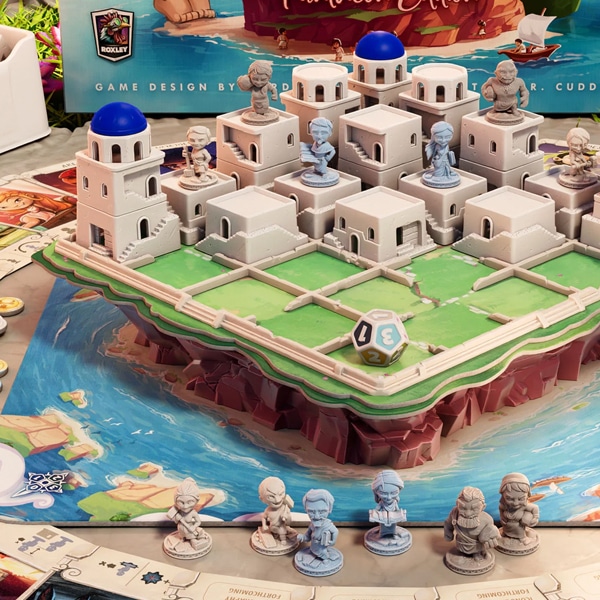
4. Hive
For those who prefer portable and tactile abstract strategy games, Hive is a game that combines simplicity with strategic challenges. Hive is played without a game board, allowing players to take the game with them wherever they go. The game consists of hexagonal tiles representing different types of insects, each with its own unique movement capabilities.
In Hive, players take turns placing and moving their insect tiles to surround and trap the opponent's queen bee. The game's strategic depth lies in the interplay between the different insect abilities and the need to anticipate and counter the opponent's moves. The absence of a game board adds a level of flexibility to the game, allowing players to experiment with different strategies and adapt to changing situations.

5. Azul
Azul requires careful tile management and strategic decision-making. Players must consider the future moves of their opponents and adapt their strategies accordingly. It is essential to analyze the available tiles, anticipate the choices of other players, and optimize each placement for maximum points. Additionally, players must be mindful of the potential negative points for leftover tiles.
The strategic depth combined with the accessible rules makes Azul enjoyable for both casual and experienced gamers. Its replayability is also enhanced by the random setup of tiles, ensuring a fresh experience with each play.

6. Yinsh
Yinsh challenges players to outmaneuver their opponents on a hexagonal board using rings and markers. With its elegant gameplay and deep strategic possibilities, Yinsh has gained a dedicated following among abstract game enthusiasts.
Each player starts with five rings of their color and takes turns placing or moving them. When a ring is moved, a marker of the player's color is placed in its original location. The objective is to create a line of five markers in a row, either horizontally, vertically, or diagonally.
The game offers a delicate balance between offensive and defensive play. Players must carefully position their rings to set up future moves while simultaneously preventing their opponent from achieving their goals. The dynamic nature of the game board and the need for long-term planning make Yinsh a deeply strategic experience.
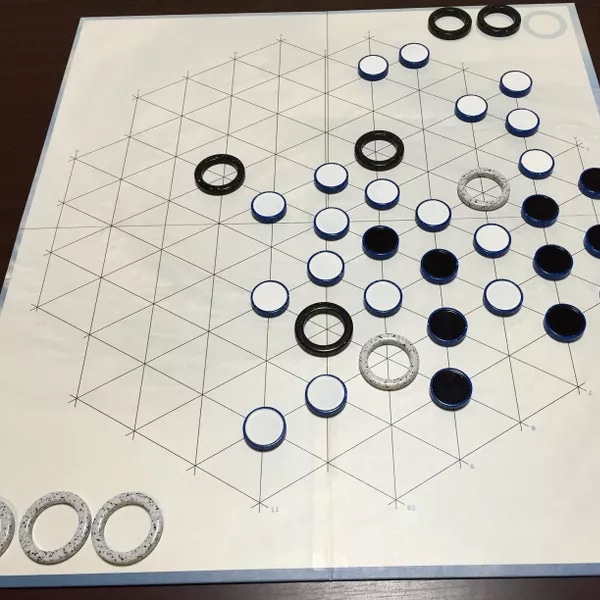
7. Volo
Volo is a lesser-known abstract strategy game that deserves more attention. In Volo, players control flocks of birds represented by pieces on a 10 x 8 grid. The goal is to connect all of the player's pieces in one large group. Players can either add new pieces or move existing ones. When adding a piece, it cannot be adjacent to friendly pieces. When moving a group of pieces, they must move together in a straight line, potentially growing in size.
Players must strategically place or move their pieces to create connections while preventing their opponent from doing the same. The game introduces a fascinating dilemma: adding a piece to block the opponent's flocks may hinder the player's own progress towards victory. This strategic complexity keeps players engaged and constantly evaluating their options.
These are just a few examples of the wide variety of abstract strategy board games available to explore. Each game offers a unique gameplay experience and strategic challenges that will keep players engaged and coming back for more.
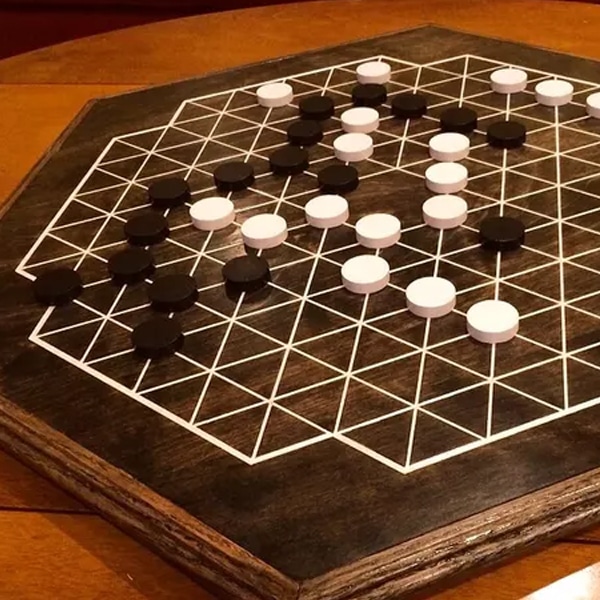
The benefits of playing abstract strategy board games
As a game designer, it's vital to understand the various benefits of the game genre you want to create so you can be sure that your design provides the exact experience for which gamers are looking. Engaging in abstract strategy board games offers a range of benefits beyond pure entertainment. These games provide a mental workout that exercises critical thinking, problem-solving, and strategic planning skills. Let's explore some of the key benefits that playing abstract strategy games can offer.
1. Cognitive development
As we've seen, abstract strategy board games require players to engage in critical thinking and problem-solving and this is the primary appeal of this genre to those gamers who love it. Players must analyze the game state, anticipate their opponent's moves, and make strategic decisions based on their understanding of the game mechanics. This process promotes cognitive development by enhancing logical reasoning, spatial awareness, and strategic planning skills.
2. Focus and concentration
Playing abstract strategy games requires focus and concentration. Players must pay attention to changing flow and structure of the conditions, evaluate various options, and make informed decisions. This level of concentration helps improve attention span and the ability to focus on tasks, both in the game and in real-life situations.
3. Decision-making skills
Abstract strategy games provide a platform for players to develop and refine their decision-making skills. Players must evaluate the potential outcomes of their moves, weigh the risks and rewards, and make decisions that align with their overall strategy. This process fosters the development of sound decision-making skills that can be applied in various aspects of life.
4. Strategic thinking
Strategic thinking is at the core of abstract strategy games. Players must analyze the dynamics of the situation, develop a plan, and adapt their strategies based on the actions of their opponents. This level of strategic thinking promotes analytical skills, the ability to think ahead, and the capacity to devise creative solutions to complex problems.
5. Social interaction
Although abstract strategy games are often played with just two players, they still provide opportunities for social interaction and friendly competition. Players can engage in strategic discussions, analyze each other's moves, and enjoy the thrill of a well-executed strategy. These games foster social bonds and create memorable experiences that can be shared with friends and family.
Tips for getting started with abstract strategy board game design
If you're new to abstract strategy board game design and want to dive into the world of mindful gaming, here are some tips to get you started:
- Start with simple games: begin by playing and making notes on games that have simple rules and mechanics to ease yourself into the genre and get a good foundation in how and why these games work. Games like Hive or Santorini are excellent choices for beginners.
- Learn from online resources: take advantage of online resources, such as video tutorials and rule explanations, to learn how to play new games. Many game manufacturers have instructional videos to support their game products. As a game designer, you can learn a lot from these beyond simply how to play the game. Our own complete guide to game design is a fantastic one-stop resource that offers valuable insights and guidance along with practical tips and examples for beginner game designers, covering every aspect of the process.
- Play with experienced players: Playing with experienced players can help you learn new strategies and improve your gameplay while giving you deeper insight into the higher potential of a game concept in the hands of a skilled gamer. Observe their moves, ask questions, and seek feedback to enhance your understanding of the game.
- Talk to experienced designers: the game design world is a big and friendly community of people driven by a real passion for what they do. Go to conferences, store events, and conventions. Track down game designers you admire and talk to them. Most will be delighted to share their knowledge and experience with new, enthusiastic fellow game designers.
- Practice and experiment: The more you play existing abstract strategy games, the more ideas you'll generate of your own. Take the time to devise new strategy game concepts and experiment with new approaches to the genre. This process of trial and error will help you develop your own unique game concept.
- Enjoy it: abstract strategy board game design can be challenging, but that's part of its appeal. Embrace the challenge, enjoy the work, and view errors as opportunities to learn and improve. With each new game design iteration, you'll gain a deeper understanding of the mechanics and strategies you need to create a game that people love to play.
Remember, the key to enjoying abstract strategy board games and their design is to approach the project with an open mind, a willingness to learn, and a desire to engage in the full creative process.
Abstract strategy board games offer an immersive and intellectually stimulating gaming experience. They provide a break from luck-based games and allow players to focus solely on their strategic thinking and decision-making skills. Whether you're a casual gamer or a seasoned strategist, abstract strategy games offer a world of endless possibilities and strategic exploration.
As you delve into the world of abstract strategy board game design, remember to embrace the challenge, learn from experienced players and designers, and enjoy the process of honing your creative skills. With each iteration of your game design, you'll discover new possibilities, develop your own design style, and engage in an intellectually invigorating experience that will keep you — and people who play your game — coming back for more.
Talk to us!
Contact us when you're ready to print your board game and manufacture its components. We have over 25 years of experience in the industry, assisting independent creatives such as yourself to achieve their goals. When you're ready, we'll provide you with a free, no-obligation quote for the work, so you know precisely what's involved. We look forward to working with you!


